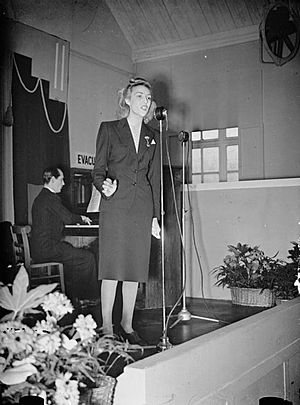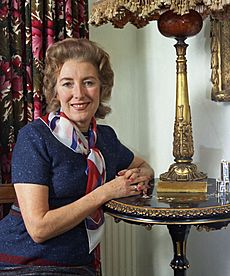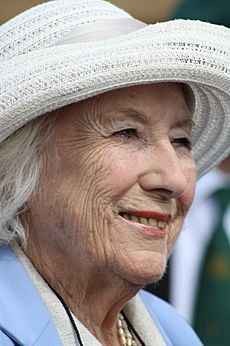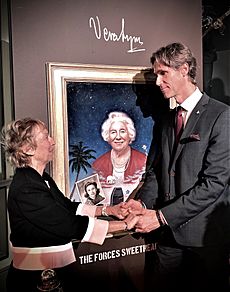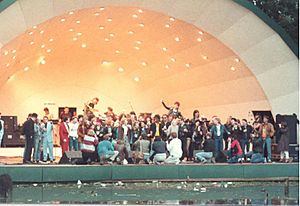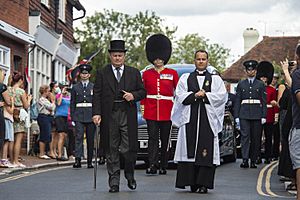Vera Lynn facts for kids
Quick facts for kids
Dame
Vera Lynn
|
|
|---|---|
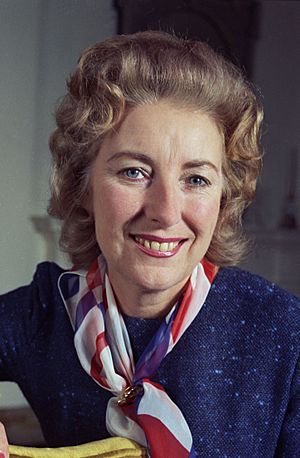
Portrait by Allan Warren, c. 1973
|
|
| Born |
Vera Margaret Welch
20 March 1917 East Ham, Essex, England
|
| Died | 18 June 2020 (aged 103) Ditchling, East Sussex, England
|
| Years active | 1924–2020 |
| Spouse(s) |
Harry Lewis
(m. 1941; died 1998) |
| Children | 1 |
| Musical career | |
| Genres | |
| Labels |
|
| Military career | |
| Allegiance | United Kingdom |
| Service/ |
Entertainments National Service Association |
| Years of service | 1939–1945 |
| Battles/wars | Battle of Kohima |
Dame Vera Margaret Lynn (born Vera Margaret Welch; 20 March 1917 – 18 June 2020) was a famous English singer and entertainer. Her songs were very popular during World War II. People lovingly called her the "Forces' Sweetheart". She sang for soldiers in places like Egypt, India, and Burma. This was part of the Entertainments National Service Association (ENSA).
Some of her most famous songs include "We'll Meet Again", "(There'll Be Bluebirds Over) The White Cliffs of Dover", and "There'll Always Be an England". She stayed popular after the war. She had hits like "Auf Wiederseh'n, Sweetheart" and "My Son, My Son".
In 2009, when she was 92, she became the oldest artist to have a number one album in the UK. This was with her album We'll Meet Again: The Very Best of Vera Lynn. She continued to release music even at 100 years old. She spent 96 years in the music business.
Vera Lynn also did a lot of work for charities. She helped ex-servicemen, children with disabilities, and breast cancer research. Many people loved her, especially those who fought in World War II. In 2000, she was named the Briton who best showed the spirit of the 20th century.
Contents
Early Life and First Steps in Music
Vera Margaret Welch was born in East Ham, England, on 20 March 1917. Her father, Bertram Samuel Welch, was a plumber. Her mother, Anne Martin, was a dressmaker. When Vera was two, she became very sick with diphtheria. She almost died and spent three months in a special hospital. Because of this, her mother was very protective of her.
Vera started performing when she was just seven years old. When she was eleven, she chose "Lynn" as her stage name. This was her grandmother Margaret's maiden name. At 11, she joined a group called Madame Harris's Kracker Kabaret Kids. In 1933, she joined Howard Baker's band. She also toured briefly with Billy Cotton's band in 1934.
Her first record, "It's Home", was made with Howard Baker on 17 February 1935. Her first time singing on the radio was on 21 August 1935. She sang with the Joe Loss Orchestra. In 1936, she released her first solo record, "Up the Wooden Hill to Bedfordshire". She joined the Ambrose band in 1937. She stayed with them until 1940, when she started her solo career.
Vera Lynn's Role During World War II
Vera Lynn's help during the war began when she sang for people hiding in London's tube stations during air raids. She drove there in her car. From 1937 to 1940, she also toured with Bert Ambrose's band. They performed on the BBC and Radio Luxembourg.
The Daily Express newspaper asked British soldiers to name their favorite singers. Vera Lynn was chosen as the top singer. This is how she became known as "the Forces' Sweetheart". On 1 July 1940, Lynn performed her first solo show in Coventry.
Vera Lynn is most famous for the song "We'll Meet Again". She first recorded it in 1939. The song's words were very hopeful. They talked about meeting again "some sunny day". This made it a very important song during the war. Another well-known wartime hit was "The White Cliffs of Dover".
Her weekly radio show, Sincerely Yours, started on 9 November 1941. It was 30 minutes long and sent messages to British troops overseas. She sang songs that soldiers requested. She also visited hospitals to send personal messages from new mothers to their husbands.
During the war, she joined ENSA. She traveled to Egypt, India, and Burma. There, she gave outdoor concerts for British soldiers. In March 1944, she sang for troops before the Battle of Kohima. In 1985, she received the Burma Star medal for her work.
Between 1942 and 1944, she acted in three movies about wartime. In 1943, she starred in We'll Meet Again. This film was based on her own life. She also made Rhythm Serenade (1943) and One Exciting Night (1944).
Life and Career After the War
Vera Lynn's only child, Virginia Penelope Ann Lewis, was born on 10 March 1946. After the war, Lynn wanted to focus on her family. But she had a contract with Decca Records. So, she returned to performing in 1947. Her husband, Harry Lewis, became her manager.
In 1952, her song "Auf Wiederseh'n, Sweetheart" became her best-selling record. It was the first song by a British artist to reach number one in the United States. It stayed at the top for nine weeks. In Britain, it was the best-selling song of the year.
Her popularity continued through the 1950s. Her song "My Son, My Son" became a number-one hit in 1954. In 1956, she started her first TV series. She also signed a special contract with the BBC for radio and TV work.
In 1960, she left Decca Records and joined EMI. She recorded many albums with different types of songs. These included traditional hymns, pop, and country songs. She also re-recorded many of her famous 1940s songs. In the 1980s, she recorded two albums with modern pop songs.
She hosted her own TV show on BBC1 in the late 1960s and early 1970s. She also appeared on other popular shows. In 1976, she hosted a BBC show celebrating pop music hits. Vera Lynn performed at the Royal Variety Performance seven times. She is also the only artist to have songs on the British charts from when they started until the 21st century.
Later Years and Legacy
Lynn sang outside Buckingham Palace in 1995. This was for the 50th anniversary of VE Day. In 2005, she made a surprise appearance at a VE Day concert in London. She gave a speech, thanking the veterans and asking young people to remember their sacrifice. She sang a few lines of "We'll Meet Again".
In September 2009, at 92, Lynn became the oldest living artist to reach number one on the British album chart. Her album We'll Meet Again: The Very Best of Vera Lynn topped the charts. She beat Bob Dylan for this record.
Three days before her 100th birthday in March 2017, a new album called Vera Lynn 100 was released. It featured her original singing with new music. It also included duets with other singers. By October 2017, she was the best-selling female artist of the year in the UK.
In January 2020, a new painting of Lynn was given to the Royal Albert Hall. This was for the 75th anniversary of the end of the war. On 5 April 2020, Queen Elizabeth II used the words "We'll Meet Again" in a speech about the COVID-19 pandemic. For the 75th VE Day anniversary, Lynn and Katherine Jenkins sang a virtual duet.
In June 2021, a wildflower meadow on the White Cliffs of Dover was named in her honor.
Charity Work and Helping Others
Vera Lynn was very active in charity work. In 1953, she started a charity called SOS (The Stars Organisation for Spastics) for children with cerebral palsy. She became its chairperson. In 1976, she founded The Vera Lynn Charity Breast Cancer Research Trust. She was also its chairperson and later its president.
In 2002, Lynn became president of The Dame Vera Lynn Trust for Children with Cerebral Palsy. She also supported other charities. These included the Forces Literary Organisation Worldwide for ALL and the Dover War Memorial Project. In 2013, she joined a PETA campaign against pigeon racing. She said it was "utterly cruel".
Personal Life and Family
During World War II, Vera Lynn lived with her parents in Barking, London. In 1941, she married Harry Lewis. He was a clarinet player and also part of Ambrose's orchestra. They had met two years earlier. Harry Lewis later became Lynn's manager.
After the war, Lynn and Lewis moved to Finchley, north London. From the 1960s, they lived in Ditchling, East Sussex. They lived next door to their daughter.
They had one child, Virginia Penelope Anne Lewis, born in March 1946. Harry Lewis passed away in 1998.
Death and Tributes
Vera Lynn died on 18 June 2020 at her home in East Sussex. She was 103 years old. Many people, including the Royal Family, paid tribute to her. Queen Elizabeth II sent her condolences. Prince Charles and the Duchess of Cornwall also shared their respects. The Prime Minister, Boris Johnson, and other leaders honored her in Parliament. Musicians like Sir Paul McCartney and Katherine Jenkins spoke about her great impact.
On the day she died, the BBC stopped its regular shows to broadcast tributes to her. The Band of the Coldstream Guards played her song "We'll Meet Again". After her death, Katherine Jenkins started a campaign to build a statue of Vera Lynn near the White Cliffs of Dover.
Lynn had a military funeral on 10 July 2020 in East Sussex. Her procession went from her home in Ditchling to the Woodvale Crematorium in Brighton. Many people came to watch. Ditchling was decorated with poppies. Images of Lynn were projected onto the White Cliffs of Dover. "We'll Meet Again" was played across the English Channel.
Her funeral procession was joined by members of the Royal Air Force, the British Army, and the Royal Navy. A Battle of Britain Spitfire plane flew over Ditchling three times. Her coffin was covered with a Union Flag. A bugler from the Royal Marine played for her. A public memorial service will be held later. On 21 March 2022, a special service for Lynn was held at Westminster Abbey.
Music Albums
Studio Albums
| Title | Details | Peak chart positions | Certifications |
|---|---|---|---|
| UK | |||
| Sincerely Yours |
|
— | |
| Vera Lynn Concert |
|
— | |
| If I Am Dreaming |
|
— | |
| The Wonderful World of Nursery Rhymes |
|
— | |
| Vera Lynn Sings...Songs of the Tuneful Twenties |
|
— | |
| Sing With Vera (With the Williams Singers and Geoff Love & His Orchestra) |
|
— | |
| Yours (With the Williams Singers and Geoff Love & His Orchestra) |
|
— | |
| As Time Goes By (With the Williams Singers and Geoff Love & His Orchestra) |
|
— | |
| Hits of the Blitz (With Tony Osborne & His Orchestra) |
|
— | |
| The Wonderful Vera Lynn (With Tony Osborne & His Orchestra) |
|
— | |
| Among My Souvenirs (With Tony Osborne & His Orchestra) |
|
— | |
| More Hits of the Blitz (With the Sam Fonteyn Orchestra) |
|
— | |
| Hits of the 60's – My Way (With Alyn Ainsworth and Orchestra) |
|
— | |
| Unforgettable Songs by Vera Lynn (With Alyn Ainsworth and Orchestra) |
|
— | |
| Favourite Sacred Songs (With the Mike Sammes Singers) |
|
— | |
| Vera Lynn Remembers – The World at War (With Alyn Ainsworth and Orchestra) |
|
— | |
| Christmas with Vera Lynn (With Alyn Ainsworth and Orchestra) |
|
— | |
| Vera Lynn in Nashville |
|
— | |
| Thank You For the Music (I Sing The Songs) |
|
— | |
| Singing To the World |
|
— | |
| 20 Family Favourites |
|
25 |
|
| Vera Lynn Remembers |
|
— | |
| We'll Meet Again |
|
44 | |
| Unforgettable |
|
61 |
Compilation Albums
| Title | Details | Peak chart positions | Certifications | ||||||||
|---|---|---|---|---|---|---|---|---|---|---|---|
| UK | IRE | EU | DUT | NOR | NZ | DEN | BEL | AUS | |||
| Hits of the War Years |
|
— | — | — | — | — | — | — | — | 32 | |
| We'll Meet Again: The Very Best of Vera Lynn |
|
1 | 48 | 8 | 83 | 18 | 8 | 28 | 10 | 21 |
|
| National Treasure – Ultimate Collection |
|
13 | — | — | — | — | — | — | — | — | |
| Her Greatest from Abbey Road |
|
45 | — | — | — | — | — | — | — | — | |
| Vera Lynn 100 |
|
3 | — | — | — | — | — | — | — | — |
|
Charted Singles
| Year | Title | Peak chart positions | |||
|---|---|---|---|---|---|
| UK | US | US A/C |
US Cashbox |
||
| 1948 | "You Can't Be True, Dear" | — | 9 | — | — |
| 1949 | "Again" | — | 23 | — | — |
| 1952 | "Auf Wiederseh'n, Sweetheart" | 10 | 1 | — | 1 |
| "Forget-Me-Not" | 5 | — | — | — | |
| "The Homing Waltz" | 9 | — | — | — | |
| "Yours (Quiéreme Mucho)" | — | 7 | — | 10 | |
| 1953 | "The Windsor Waltz" | 11 | — | — | — |
| 1954 | "We'll Meet Again" | 55 | 29 | — | — |
| "If You Love Me (Really Love Me)" | — | 21 | — | 5 | |
| "My Son, My Son" | 1 | 28 | — | 22 | |
| 1956 | "Who Are We" | 30 | — | — | — |
| "Such a Day" | — | 96 | — | 45 | |
| "A House with Love in It" | 17 | — | — | — | |
| 1957 | "The Faithful Hussar (Don't Cry My Love)" | 29 | 55 | — | 40 |
| "Travellin' Home" | 20 | — | — | — | |
| 1967 | "It Hurts to Say Goodbye" | — | — | 7 | — |
| 2014 | "We'll Meet Again" (duet with Katherine Jenkins) | 72 | — | — | — |
| 2020 | "Land of Hope and Glory" | 17 | — | — | — |
Movies Featuring Vera Lynn
| Film | Year | Role | Notes | Ref |
|---|---|---|---|---|
| We'll Meet Again | 1942 | Peggy Brown | ||
| Rhythm Serenade | 1943 | Ann Martin | ||
| One Exciting Night | 1944 | Vera Baker | also known as You Can't Do Without Love | |
| Venus fra Vestø | 1962 | |||
| A Gift for Love | 1963 | music performance |
See also
 In Spanish: Vera Lynn para niños
In Spanish: Vera Lynn para niños
 | Stephanie Wilson |
 | Charles Bolden |
 | Ronald McNair |
 | Frederick D. Gregory |


